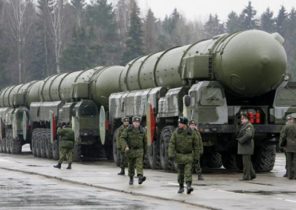
Houston — Exxon Mobil is trying to achieve from the Ministry of Finance of the easing of sanctions to conduct drilling operations in the Black sea in the framework of the joint project with Rosneft, the Russian state oil company. This was reported on Wednesday a former official of the state Department. One of the representatives of the oil industry confirmed this message.
The request for a relaxation of the sanctions was done under the Obama administration, said these officials on the condition of anonymity, and the American company upheld this proposal. It was delivered to the administration trump in a delicate time in U.S.-Russian relations amid growing tensions over the war in Syria and the upcoming Senate investigation of reports of Russia’s attempts to influence the presidential elections in the United States.
This call did not sound at the time of the hearings in the Senate regarding confirmation as Secretary Rex Tillerson, who before his appointment by President trump was the head of Exxon Mobil. In addition, it is no secret that he has developed a strong business relationship with Russian President Vladimir Putin. At the time, according to Mr. Tillerson, and other officials of the oil company, they did not lobby against the sanctions imposed against Russia in response to its military intervention in Ukraine.
However, Mr. Tillerson and officials, in fact, announced that the company Exxon Mobil received permission to continue drilling test wells in waters of the Russian Arctic. Officials of this company also said that they urged the administration of President Obama to lead us sanctions in accordance with the sanctions of the European Union, which provide greater flexibility in European companies that continue to participate in certain Russian projects.
On request of Exxon Mobil regarding the withdrawal from the sanctions list of projects in the Black sea said Wednesday, the Wall Street Journal.
Responding to a question about easing sanctions, a spokesman for the company ExxonMobil Alan Jeffers (Alan Jeffers) said: “We do not comment on topical issues”. The representative of the Ministry of Finance announced that his office does not comment on questions about specific licenses or requests for easing of the sanctions regime.
The representative of the oil industry said that this request was made in 2015, and the company Exxon Mobil understood that it could lose the right under the contracts for exploration in the Black sea, if you do not start drilling before the end of 2017. European companies, in particular the Italian oil giant Eni, in this case, it will be able to take on this work.
Russian media quoted the words of Daniele Runje (Zeljko Runje), Vice-President of Rosneft offshore projects, which in June last year said “next year we will drill together with Eni. That is our plan. In the Black sea”.
European sanctions do not apply to some contracts signed by European companies, while U.S. sanctions were tougher, say experts in the field of international energy projects.
Hal Eren (Eren Hal), a former employee of Department of the Ministry of Finance of foreign assets control (Department’Treasury’s Office of Foreign Assets Control) said that requests for such easing of sanctions have been rare, and rarely issued such permits. In most cases, he said, they were given only for reasons of environmental protection or security. Request of Exxon Mobil is unlikely to be satisfied by reason of the narrow focus of the current sanctions, he said.
“I don’t think that they will be issued with a license, especially given the political context in which all this is happening,” said Mr. Eren. Sanctions the United States and Europe were imposed on Russia in March 2014 in response to the annexation of Crimea by Moscow and its rejection of Ukraine. Even against the backdrop of deepening Ukrainian crisis, Exxon Mobil continued to insist on more close cooperation with the Russian oil industry.
The head of Exxon Mobil exploration Neil Duffin (Neil W. Duffin) spring signed an agreement to expand joint projects, although the chief Executive officer of Rosneft, Igor Sechin, personally included in the sanctions list. This transaction does not violate any laws, but it was concluded, despite the clear risk of imposing broader sanctions because of the war in Ukraine.
Tougher sanctions regarding the transfer of the most modern technologies in the field of drilling, as well as in relation to the company Rosneft was introduced a few months later, when Russia was zameshennoy in the incident with the downed airliner flight MH-17 Malaysian airlines over Eastern Ukraine.
Exxon Mobil has received several permits for the easing of the sanctions regime.
In September and October 2014, she was allowed to complete the drilling for one of the modern drilling platform in the Kara sea in the Arctic. Then it was stated to be unsafe for the equipment and to the environment, if the well will remain incomplete. It was not oil production, but it has been identified for further development.
As head of Exxon Mobil, Mr. Tillerson did not agree with the initial sanctions before their tightening in late 2014. At the annual meeting of the company in 2014, he said, “Usually we do not support sanctions, because we believe them to be ineffective unless they are applied soovetstvuyuschim comprehensively, and it is very difficult to do.”
As Secretary of state, Mr. Tillerson criticized the Russian policy, and he recently reacted negatively to the ongoing support of Mr. Putin to the Syrian government. He said nothing that any sanctions must be lifted.
Mr. Tillerson promised to take a clear position in relation to the decisions that could affect his former employer.
A request for easing of sanctions drew criticism Wednesday on several fronts. Senator John McCain, Republican of Arizona and an outspoken critic of Mr. Putin, asked the question on Twitter: “are They crazy?” Michael McFaul, who under President Obama was the United States Ambassador to Russia, expressed this opinion on Twitter: if the administration trump will give such permission, “then made at last week’s tough words against Russia will remain.”
Exxon Mobil was particularly active in Russia at a time when the Obama administration early on was trying to implement a “reset” of relations to Moscow, and it helped re-open the Russian oil fields to foreign investment. In early 2011, Exxon Mobil signed an agreement to conduct geological exploration in the Black sea, and promised to share the profits if oil is found.
Drilling rights in the Black sea were also included in a large-scale agreement on strategic partnership, which Mr. Tillerson signed with the Russian state-owned company later in the same year. The shelf of the Black sea potentially rich in hydrocarbon reserves, yet exploration was rather limited. Drilling is proposed to conduct in a prospective block located in the East of Crimea, but this place is not contested by Ukraine.
This is one of the few places in Russia where the company Exxon Mobil hopes to expand its reserves for future developments. Its drilling projects in the Barents sea and in the Bazhenov formation, in fact, closed due to sanctions.
Exxon Mobil continues drilling for conventional deposits off the island of Sakhalin and in Siberia, which do not fall under the sanctions prohibiting the transfer of technology for special drilling operations in Arctic seas and on the continental shelf.
In August 2011, in the framework of its strategic partnership agreement, Exxon and Rosneft agreed to invest $ 3.2 billion in exploration in the Arctic ocean and in the Black sea, in the area of the license area “the Tuapse deflection”. Its area, according to the web site of the company Rosneft, is about 11 thousand square kilometers and the depth reaches up to 2 thousand meters.
In the preparation of this material took part Andrew Kramer (Andrew E. Kramer) in Moscow, and Alan Rappaport (Alan Rappeport) in Washington.







